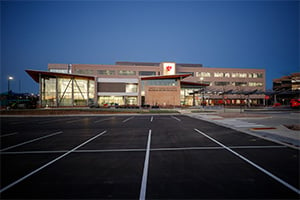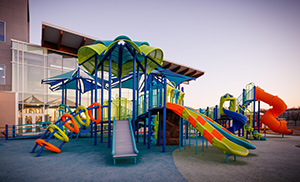Dream Come True
March 8, 2020

|
| Image of the new Munroe-Meyer Institute |
The people of the Munroe-Meyer Institute have imagined it many times, for many years - creating a space that does not exist anywhere else.
They have dared to dream this dream for the individuals and families they serve. They have talked to these families, listened to what they needed, what they wanted. Now, here it is.
As MMI opens its new home at 6902 Pine St., near the University of Nebraska at Omaha's Scott campus, "this is a dream literally come true," said MMI Director Karoly Mirnics, MD, PhD.
"With this new building, MMI is positioned as never before to support the intellectual and developmental disability (IDD) community as it strives for awareness, acceptance and opportunity," Dr. Mirnics said. "This building will fuel a palpable change in the IDD community, and in the wider community, as well, as we work together toward those goals."
That is what MMI does, at its best. It travels alongside, an active partner with the families it serves, providing resources across the lifespan through skilled providers, cutting-edge therapies and a passion for its mission. It empowers families to create and reach goals.
MMI's mission is to be world leaders in transforming the lives of all individuals with disabilities and complex health care needs. Not, Dr. Mirnics notes, to simply "improve" or "help." To transform. This new building allows MMI to transform the way it serves families.
"We created a unique building, the most advanced facility in the nation for those families impacted by IDD," Dr. Mirnics said. "We wanted to create a new standard in IDD care for families, and we turned to these families - experts in their own right - to discover what they wanted that facility to be."
UNMC Chancellor Jeffrey P. Gold, MD, called the new building a doorway into the institute's second century. "Since its beginnings, Munroe-Meyer Institute has worked to improve the lives of the people and families it serves," Dr. Gold said. "This new home gives it a much larger space and increased versatility and flexibility, but the core of the MMI mission - helping those with intellectual and developmental disabilities to overcome challenges, to live fuller, richer lives - remains the same. We are forever grateful to all of the private philanthropists from our community who have invested in this world-class facility and the MMI mission.

"All of UNMC is excited to see how our colleagues at MMI will continue to grow in their new home to provide even more effective clinical care, education and research, all in the name of enhancing the lives of the people and families they serve."
Alison Topp, facilities planner with the UNMC Department of Facilities Management and Planning, and her team spent countless hours over several years working with MMI leaders, providers and community stakeholders to fine-tune this new home. Through the challenges of 2020, they pressed to keep everything on schedule. A new home, full of possibilities, built to advance the goals of MMI's families.
"We wanted to build a premier facility, but there was no other entity with MMI's comprehensive collection of programs and services to model it after," said Melonie Welsh, MS, director of the MMI Department of Community Engagement. "Still, we were committed to our mission, and we listened to our community - providers, collaborators and especially the families we serve. They played a critical role in deciding what this building would be."
The building will lead to better outcomes and experiences for families that receive services at MMI, said Ted Friedland, a member of the Community Advisory Committee and the father of a child who receives services at MMI.
"From the onset, they have been very open to our input," Friedland said. "We are extremely excited about this new building. "We have been really pleased with the services we have received over the years from MMI, and I feel the new building is only going to enhance our experience," he said. "I realize it's only brick and mortar - but it will be brighter and more inviting, with many new amenities, and that is going to be really beneficial not only to our son, but also to all of the children who receive services at MMI.
"The accessibility is going to be monumental," Friedland said. "It will be so much more convenient from an access perspective, even just in terms of parking. Also, the Scott campus location is going to give the institute a lot more visibility in the wider community."
The physical aspects of the building, which is more than double the size of MMI's former home, are apparent - more room for growth of existing programs and the development of new ones, ample parking, entrances and a floor plan designed to accommodate the needs of the individuals MMI serves.
The scale of the two magnificent, moving-art sculptures placed at its front serves to create both a destination and a sense that you have arrived. MMI finally has a "front door."
As one enters, a stylized "tree" to the left reaches to the ceiling, with a green canopy of "leaves" spreading overhead and "birds" flying above. The message is clear: We are here to help you soar. To the right of the welcome desk, there is a gift shop and a coffee shop; to the left, the family resource center, with its large indoor playground.
The area is bright and welcoming - throughout the building designers have paid close attention to colors, textures and lights, creating a sensory-friendly environment. Topp said that she loved working with the MMI staff as they examined how they had been operating with the old building and imagined all that could be possible with the new - how it could change the experiences, and the lives, of MMI families.
The new building is set to open in the first quarter of 2021. The acquisition and redevelopment of the building will effectively double the institute's current size to more than 220,000 square feet, in response to the exponential growth in the population served. The University of Nebraska Foundation continues to seek contributions to support the programmatic costs associated with the institute.
Major donors included:
Lead benefactors
- William and Ruth Scott Family Foundation
- Weitz Family Foundation
- Suzanne & Walter Scott Foundation
- Hattie B. Munroe Foundation
Principal benefactors
- Clarkson Regional Health Services
- Holland Foundation
- Robert B. Daugherty Foundation
- The Lozier Foundation







